英语来源英文版
英文外来语(完整版)1

来自中文的外来语
• • • • • oolong tea 乌龙茶 Erhu 二胡 Lychee 荔枝 Longan 龙眼 Gongfu tea 功夫 茶 • Kaolinite 高岭土 • Ketchup 茄汁 • Cheongsam 旗袍
•
来自法语的外来语 历史上, 英语长期受法语影响,来自法语
的词汇约占英语的三分之一左右。 • 公元十一世纪至十五世纪诺曼人占领英国 期间, 法语成为英国社会的 统治语言, 从表示政治、行政 管理的词汇到表示物质 生活的许多 词汇, 都源 于法语。与通俗、质朴 的本族语相比, 法语词 较 庄严、文雅。
来自法语的外来语
•表达简陋的物质生活的词汇: Chair 椅子 (法) Dinner 正餐(法) Feast 筵席(法) •表牲畜的英语词, 而餐桌上 美味的词汇: cow 奶牛 bull 公牛 pig 猪
追求外来语时亦情亦趣,谐音达意, 不仅仅是中国人承袭于祖先独特的审美观 之反映,它同时也是由中国汉语的 本质决定的。汉语是以象形为原则 的文字,具有同音异义字较多 的特点,对外存在一定的封闭性。 这是中国人对待引进的词汇大多 只能采用意译的一个重要原因。
一、类别分布 Speake在《牛津外来语词典》的前言中指出“许多新近被吸收的
• 其中本族词比较质朴、常用, 拉丁或希腊 语词有较浓厚的书卷语色彩, 法语 词大多介于两者之间。这些不同
来源的同义词具有各自的侧重点
及涵义, 赋予了不同的感情色彩, 正是由于这种特征, 使英语成为一种异常丰富的语言。
来自 • Judo 柔道(OK(カ ラオケ) • Karate 空手道(空手, からて) • Kimono 和服(着物, きもの) • Ninja 忍者(忍者,に んじゃ) • Sashimi 生鱼片(刺 身,さしみ)
英语的发展史(中英文版)
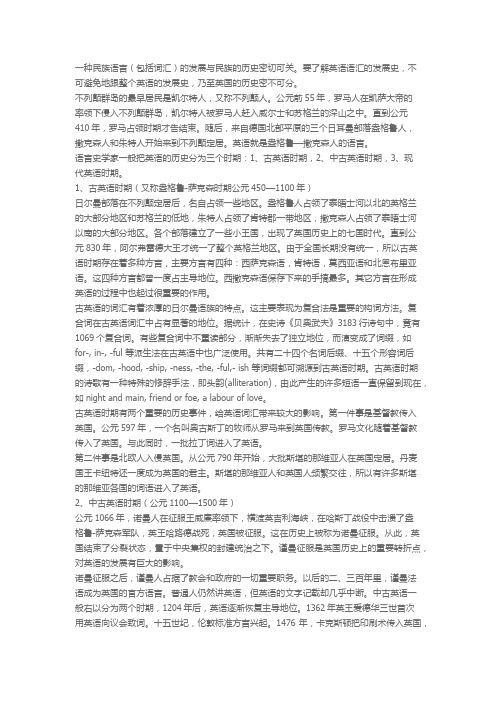
一种民族语言(包括词汇)的发展与民族的历史密切可关。
要了解英语语汇的发展史,不可避免地跟整个英语的发展史,乃至英国的历史密不可分。
不列颠群岛的最早居民是凯尔特人,又称不列颠人。
公元前55年,罗马人在凯萨大帝的率领下侵入不列颠群岛,凯尔特人被罗马人赶入威尔士和苏格兰的深山之中。
直到公元410年,罗马占领时期才告结束。
随后,来自德国北部平原的三个日耳曼部落盎格鲁人,撒克森人和朱特人开始来到不列颠定居。
英语就是盎格鲁—撒克森人的语言。
语言史学家一般把英语的历史分为三个时期:1、古英语时期,2、中古英语时期,3、现代英语时期。
1、古英语时期(又称盎格鲁-萨克森时期公元450—1100年)日尔曼部落在不列颠定居后,名自占领一些地区。
盎格鲁人占领了泰晤士河以北的英格兰的大部分地区和苏格兰的低地,朱特人占领了肯特郡一带地区,撒克森人占领了泰晤士河以南的大部分地区。
各个部落建立了一些小王国,出现了英国历史上的七国时代。
直到公元830年,阿尔弗雷德大王才统一了整个英格兰地区。
由于全国长期没有统一,所以古英语时期存在着多种方言,主要方言有四种:西萨克森语,肯特语,莫西亚语和北恩布里亚语。
这四种方言都曾一度占主导地位。
西撒克森语保存下来的手搞最多。
其它方言在形成英语的过程中也起过很重要的作用。
古英语的词汇有着浓厚的日尔曼语族的特点。
这主要表现为复合法是重要的构词方法。
复合词在古英语词汇中占有显著的地位。
据统计,在史诗《贝奥武夫》3183行诗句中,竟有1069个复合词。
有些复合词中不重读部分,渐渐失去了独立地位,而演变成了词缀,如for-, in-, -ful 等派生法在古英语中也广泛使用。
共有二十四个名词后缀、十五个形容词后缀,-dom, -hood, -ship, -ness, -the, -ful,- ish 等词缀都可溯源到古英语时期。
古英语时期的诗歌有一种特殊的修辞手法,即头韵(alliteration),由此产生的许多短语一直保留到现在,如night and main, friend or foe, a labour of love。
200个英语单词的起源

200个英语单词的起源1、Chemistry 化学古代的炼金术士们总想找到一种方法,将低贱的金属变为金子。
现在通过原子裂变的原理表明,他们的这种想法并非一般人们想象的那么愚蠢。
古埃及人入侵欧洲后,将他们所研究的炼金术,连同其命名al-kimia一起传入欧洲。
后来,这个词变成alchemy,“炼金的人”叫做alchemist,最后成了chemistry。
“化学”的概念就是从“炼金术”演变来的。
2、Geology 地质学“地质学”是研究形成地球的物质和地壳构造,以探讨地球的形成和发展的科学。
Geology是从希腊语来的,ge即“earth”;-ology,“science”,即研究地球本身的科学。
3、Law 法律“法律”是立法机关制定的、国家政权保证执行的行为规则。
Law在古英语中写作lagu,意即“something laid down(规定下来的事情)”。
4、Electricity 电古希腊人常用琥珀制作爱情护符,确信戴着这种护符的人可以引来爱人。
他们发现,磨擦琥珀可以吸引羽毛、线头等小东西,磨擦时会放出火花。
他们就把这种磨擦起电的现象叫做elektron。
来自希腊语elektor,意即“发光的太阳”,进入拉丁语后写作electrum。
英语演变为electricity。
5、Atom 原子古希腊人认为,特质是不可能无限止地分割下去的,越分越小,最后小到不可再分。
他们把“原子”叫做atomos:a即“not”;tomos ,“cut”意即“不能再分割”以后这个词在英语中演变为atom。
尽管后来发现“原子”并非“不可再分割”,然而约定俗成,“原子”的名字仍然以atom流传下来。
6、Uranium 铀“铀”是一种放射性金属元素,化学符号为U,主要用来产生原子能。
著名的物理学家居里夫人曾用铀作实验,发现了放射现象。
Uranium这个词是从希腊神话中一位神的名字来的。
1781年,英籍德国天文学家赫瑟尔(Sir William Herschel)发现了颗尚未被人们发现的行星,于是他就借用了希腊神话中“天王”Ouranos的名字,命名这颗行星为Uranus。
英语单词的起源

英语单词的起源11、Chemistry 化学古代的炼金术士们总想找到一种方法,将低贱的金属变为金子。
现在通过原子裂变的原理表明,他们的这种想法并非一般人们想象的那么愚蠢。
古埃及人入侵欧洲后,将他们所研究的炼金术,连同其命名al-kimia一起传入欧洲。
后来,这个词变成alchemy,“炼金的人”叫做alchemist,最后成了chemistry。
“化学”的概念就是从“炼金术”演变来的。
2、Geology 地质学“地质学”是研究形成地球的物质和地壳构造,以探讨地球的形成和发展的科学。
Geology是从希腊语来的,ge即“earth”;-ology,“science”,即研究地球本身的科学。
3、Law 法律“法律”是立法机关制定的、国家政权保证执行的行为规则。
Law在古英语中写作lagu,意即“something laid down(规定下来的事情)”。
4、Electricity 电古希腊人常用琥珀制作爱情护符,确信戴着这种护符的人可以引来爱人。
他们发现,磨擦琥珀可以吸引羽毛、线头等小东西,磨擦时会放出火花。
他们就把这种磨擦起电的现象叫做elektron。
来自希腊语elektor,意即“发光的太阳”,进入拉丁语后写作electrum。
英语演变为electricity。
5、Atom 原子古希腊人认为,特质是不可能无限止地分割下去的,越分越小,最后小到不可再分。
他们把“原子”叫做atomos:a即“not”;tomos ,“cut”意即“不能再分割”以后这个词在英语中演变为atom。
尽管后来发现“原子”并非“不可再分割”,然而约定俗成,“原子”的名字仍然以atom流传下来。
6、Uranium 铀“铀”是一种放射性金属元素,化学符号为U,主要用来产生原子能。
著名的物理学家居里夫人曾用铀作实验,发现了放射现象。
Uranium这个词是从希腊神话中一位神的名字来的。
1781年,英籍德国天文学家赫瑟尔(Sir William Herschel)发现了颗尚未被人们发现的行星,于是他就借用了希腊神话中“天王”Ouranos的名字,命名这颗行星为Uranus。
英语的起源英文版

At present, English is one of the world’s most wildly used language.The history of the English language began over 1500 years ago in the north of Europe. Around the fifth century A.D., tribes of people known as the Angels, Saxons, and Jutes traveled west from Germany and Denmark across the North Sea. They settled in Britain, and by the late seventh century, they were speaking an early form the English.In the late eighth century, the Vikings attacked England. Fighting continued for almost two hundred years. During this time, many Latin, Danish, and Norse words entered the English language. Latin gave English words like kitchen and cup. From Danish and Norse, English borrowed skin, leg, and the pronouns them, their, and they. many synonyms from the Norse language became integrated into English.In 1066, the Normans conquered England. French became the language of the wealthy and powerful, and English was spoken mostly by poorer people. In the late fourteenth century, English became the first language again. By this time, many words used in English came from French or Latin, and a lot of the early words no longer existed.In the sixteenth and seventeenth centuries, people became interested in the classics. At this time, words from Latin and Greek were included in the English language. a lot of words, or parts of words, from those languages are used in modern English.Today, English has loan words from many of the world’s languages. You can probably find a word used in English that first came from your native language.At present, English is one of the world’s most wildly used languages.The history of the English language began over 1500 years ago in the north of Europe. Around the fifth century A.D., tribes of people known as the Angels and Saxons traveled west from Germany and Denmark across the North Sea. They settled in Britain, and by the late seventh century, they were speaking an early form the English.In the late eighth century, the Vikings attacked England. Fighting continued for almost two hundred years. During this time, many Latin, Danish, and Norse words entered the English language. Latin gave English words like kitchen and cup.In 1066, the Normans conquered England. French became the language of the wealthy and powerful, and English was spoken mostly by poorer people. In the late fourteenth century, English became the first language again. By this time, many words used in English came from French or Latin, and a lot of the early words no longer existed.In the sixteenth and seventeenth centuries, people became interested in the classics. At this time, words from Latin and Greek were included in the English language. A lot of words, or parts of words, from those languages are used in modern English.Today, English has loan w ords from many of the world’s languages. You can probably find a word used in English that first came from your native language.English, the United Kingdom of Great Britain and Northern Ireland, the United States of America's official language, but also by many former British colony, as well as countries of the Commonwealth as a common language or a second language, according to the English pronunciation, vocabulary and grammatical differences in the characteristics of English into Britain and the United States.English Source:English belong to the Indo-European family of Germanic languages of West Germanic, from the ancient continent of migrants from Europe to Great Britain's Anglo-Saxons and Jutes Germanic tribes who said the language evolved, through the British colonial activities spread to All over the world. According to the English-speaking size, the English may be the world's fourth-largest or third largest language (Statistics for 1999 were 322,000,000), but it is the world's most extensive second language. Last two centuries, Britain and the United States in the cultural, economic, military, political and scientific leadership in making English a universal language. English is the working language of the United Nations.And English is the closest to the Frisian; the language was still in the Netherlands in the northern province of Friesland about 50 million people. Some people think that Scotland and the English language is close to an independent language, and some people think it is a dialect of English. Scots traditionally been considered as a separate language, and some people even think that Ebonics is a separate language, but it is very controversial. In addition to the Frisian closest to the English outside the Netherlands is in the eastern part of Germany and the northern lowlands of the Saxon. Other related languages include Dutch, Afrikaans and German. Norman Conquest of England in the 11th century, a lot of French words, greatly enriched the English language.English history:Early Germanic tribes’ people immigration to England and English is the language from their inherited changes. In return, he gave the Anglo community in southeastern territory. He also sought further support, family-Saxon, Anglo ethnic Serbs and Jutes come. "Chronicle" documented the end of these "immigrants" have established the Kingdom of the seven: Innocent Bo Lila, Mercia, East and Battipaglia, Kent, Essex, Sussex, Wessel. Germans after the invasion, the rule of the Celtic peoples, the main local language in Scotland, Wales, Cornwall and Ireland down to survive. These invaders of the language gradually formed the "Old English", and like most modern Frisian. English (England, English), England (England) and East Anglia is the three words were painted from the Anglo-term development of communities: English, Anglican, England.Norman Conquest in 1066 after 300 years, the only French king of England. Therefore, a large number of French words into Old English, Old English itself has lost most of the tw ists and turns, for the evolution of Middle English. In 1500 about the Great Vowel over to Middle English to Modern English deformation. Old English literature's most famous works are "Beowulf" is the Middle English of "The Canterbury T ales."Modern English in Shakespeare's prosperity and the beginning of the period, a number of scholars will be divided into early modern English and late Modern English, as the div iding line in 1800 or so. As in most parts of the world to the British occupation and colonization,the local language to a large extent, also influenced the development of English.文案编辑词条B 添加义项?文案,原指放书的桌子,后来指在桌子上写字的人。
英语的由来英文版

英语的由来英文版The Origin of the English LanguageEnglish is one of the most widely spoken languages in the world today, but its roots stretch back through the mists of time To understand the origin of English, we need to embark on a journey that takes us through centuries of history and the influence of various cultures and languagesThe story begins with the Germanic tribes who inhabited the northern parts of Europe These tribes, including the Angles, Saxons, and Jutes, began to migrate to the British Isles around the 5th century AD They brought with them their own Germanic languages, which would form the basis of Old EnglishOld English was a very different language from the English we speak today It was highly inflected, meaning that the endings of words changed depending on their grammatical function in a sentence For example, nouns had different endings for singular and plural, and verbs had different forms for different tenses and personsThe influence of Christianity also had a significant impact on the development of the English language Latin, the language of the Christian church, introduced many new words and concepts Monks and scholars translated religious texts into English, adding to the vocabulary and complexity of the languageThe Viking invasions in the 9th and 10th centuries also left their mark The Vikings spoke Old Norse, and many words from this language were incorporated into English, especially in areas related to trade, warfare, and daily lifeThe Norman Conquest in 1066 brought a major change The Normans, who were of French origin, spoke Norman French and established themselves as the ruling class For a considerable period, French was the language of the court, law, and literature, while English was mainly spoken by the common people This led to a large number of French words entering the English language, especially in areas such as government, law, and cuisineDuring the Middle English period (1100-1500), the language began to change and simplify The inflections became less complex, and the vocabulary expanded further as a result of trade, exploration, and the growth of literature Writers like Geoffrey Chaucer played a crucial role in shaping the language and making it more accessibleThe Renaissance in the 16th century brought a renewed interest in classical learning, and many words from Latin and Greek were borrowed into English This was a period of great intellectual and cultural growth, and the language reflected this with an increase in technical and scientific terminologyThe Industrial Revolution in the 18th and 19th centuries led to further changes New inventions and technologies required new words, and English adapted and expanded to meet these needs The growth of global trade and the British Empire also spread the English language around the worldIn the modern era, English has continued to evolve and change The influence of mass media, the internet, and globalization has led to the emergence of new words and expressions, as well as changes in pronunciation and grammarToday, English is not only the language of the United Kingdom and the United States but is also widely used as a global lingua franca in business, science, and entertainment It has become a language that is constantly evolving and adapting to the needs of a changing worldIn conclusion, the origin of the English language is a complex and fascinating story that involves the interaction of multiple cultures, migrations, and historical events Through these influences and changes, English has developed into the rich and diverse language that we know today。
英语一到十二月单词及来源

英语一到十二月单词及来源英文的月份名称大多来源于古罗马的历法,包含了一些神话、帝王和数字的元素。
以下是一到十二月英文名称的起源及背后的故事。
1)January - 1月:来自罗马神话中的门神Janus,象征着开端和结束,因为一月是新的一年的开始。
2)February - 2月:源自拉丁词“Februum”,意为“净化”。
在罗马历法中,二月是净化和赎罪的月份。
3)March - 3月:源自罗马神话中的战神Mars,因为三月是古罗马进行军事活动的开始。
4)April - 4月:可能源于拉丁词“aperire”,意为“开放”,因为春天的花朵在四月开始盛开。
也有说法认为它源于希腊神话中的爱神Aphrodite。
5)May - 5月:可能来自罗马神话中的春季女神Maia。
6)June - 6月:可能源自罗马神话中的婚姻和家庭女神Juno。
7)July - 7月:最初被命名为“Quintilis”,意为第五月,因为古罗马的历法年初是在3月。
后来为了纪念罗马帝国的尤利乌斯·恺撒(Julius Caesar),将这个月改名为July。
8)August - 8月:最初被命名为“Sextilis”,意为第六月。
后来罗马帝王奥古斯都(Augustus)在这个月取得了重大胜利,于是将其改名为August。
9)September - 9月:来自拉丁语的“septem”,意为七,因为在早期的罗马历法中,它是第七个月。
10)October - 10月:来自拉丁语的“octo”,意为八,因为在早期的罗马历法中,它是第八个月。
11)November - 11月:来自拉丁语的“novem”,意为九,因为在早期的罗马历法中,它是第九个月。
12)December - 12月:来自拉丁语的“decem”,意为十,因为在早期的罗马历法中,它是第十个月。
风筝的来源英语作文
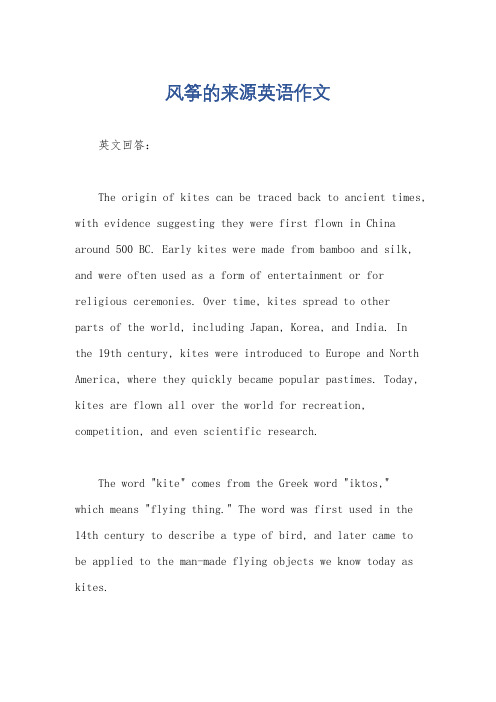
风筝的来源英语作文英文回答:The origin of kites can be traced back to ancient times, with evidence suggesting they were first flown in China around 500 BC. Early kites were made from bamboo and silk, and were often used as a form of entertainment or for religious ceremonies. Over time, kites spread to otherparts of the world, including Japan, Korea, and India. In the 19th century, kites were introduced to Europe and North America, where they quickly became popular pastimes. Today, kites are flown all over the world for recreation, competition, and even scientific research.The word "kite" comes from the Greek word "iktos,"which means "flying thing." The word was first used in the 14th century to describe a type of bird, and later came to be applied to the man-made flying objects we know today as kites.There are many different types of kites, each with its own unique design and purpose. Some kites are designed for speed, while others are designed for stability or maneuverability. Some kites are even designed to carry payloads, such as cameras or scientific instruments.Kites have been used for a variety of purposes throughout history. In addition to being used for recreation and religious ceremonies, kites have also been used for military purposes, such as surveillance and communication. In the 19th century, kites were used by scientists to study the atmosphere and to test new theories about flight.Today, kites are still used for a variety of purposes, but their primary use is for recreation. Kites are often flown at festivals and other outdoor events. There are also a number of kite competitions held around the world each year.中文回答:风筝的起源可以追溯到古代,有证据表明它们最早在公元前500 年左右在中国出现。
冷笑话的来源 英语作文
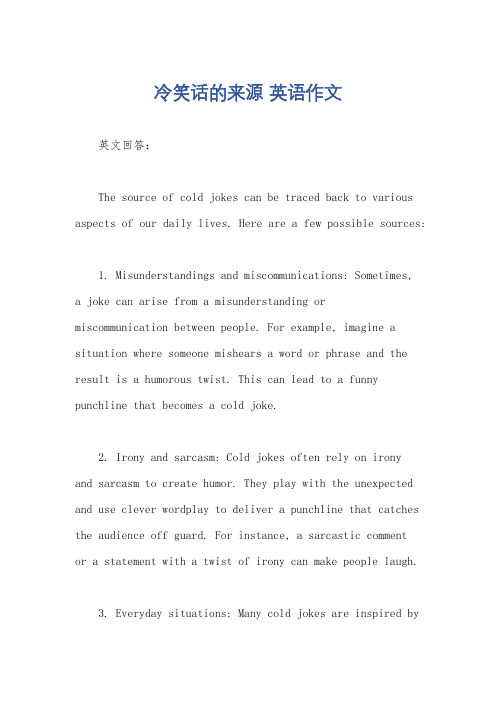
冷笑话的来源英语作文英文回答:The source of cold jokes can be traced back to various aspects of our daily lives. Here are a few possible sources:1. Misunderstandings and miscommunications: Sometimes,a joke can arise from a misunderstanding or miscommunication between people. For example, imagine a situation where someone mishears a word or phrase and the result is a humorous twist. This can lead to a funny punchline that becomes a cold joke.2. Irony and sarcasm: Cold jokes often rely on ironyand sarcasm to create humor. They play with the unexpected and use clever wordplay to deliver a punchline that catches the audience off guard. For instance, a sarcastic commentor a statement with a twist of irony can make people laugh.3. Everyday situations: Many cold jokes are inspired byeveryday situations that we can all relate to. These jokes often highlight the quirks and absurdities of our daily lives, making us laugh at ourselves and the situations we find ourselves in. For example, a joke about getting stuckin traffic or forgetting someone's name can resonate with a wide audience.4. Cultural references: Cold jokes can also draw inspiration from cultural references, such as movies, books, or popular sayings. These jokes rely on the audience's familiarity with the reference to create humor. For instance, a joke that references a famous movie scene or a well-known saying can elicit laughter from those who understand the reference.5. Wordplay and puns: Cold jokes often make use of wordplay and puns to create humor. They play with the multiple meanings of words or use similar-sounding words to create a funny twist. For example, a pun that relies on a double entendre or a clever play on words can make people chuckle.中文回答:冷笑话的来源可以追溯到我们日常生活的各个方面。
英语作文有关舞狮的来源

英语作文有关舞狮的来源英文回答:The origin of lion dance can be traced back to ancient China. It is believed to have originated during the Tang Dynasty (618-907 AD). The dance was initially performed to ward off evil spirits and bring good luck and prosperity to the community. The lion is considered a symbol of power, courage, and wisdom in Chinese culture, and the dance is performed during festive occasions such as the Chinese New Year and other celebrations.The lion dance is a vibrant and energetic performance that involves two performers inside a lion costume. Thelion costume is typically made of colorful fabric and decorated with intricate designs. The performers mimic the movements of a lion, showcasing agility, strength, and coordination. They leap, twist, and turn to the beat of drums, cymbals, and gongs, creating a mesmerizing spectacle.The lion dance is not only a form of entertainment but also deeply rooted in Chinese mythology and folklore. According to legend, a mythical creature called Nian would terrorize villages, causing destruction and chaos. The villagers discovered that Nian was afraid of loud noises and the color red. They used firecrackers and red decorations to scare away the creature. Over time, the lion dance evolved as a way to reenact this victory over Nian and to bring good fortune to the community.The lion dance has also spread to other parts of Asia, such as Taiwan, Hong Kong, and Malaysia. Each region hasits own unique style and variations of the dance. For example, the lion dance in Malaysia incorporates elements of martial arts, while the Taiwanese lion dance emphasizes acrobatic movements. These regional differences reflect the diverse cultural influences and traditions within the Chinese diaspora.In recent years, the lion dance has gained popularity worldwide and is now performed in various countries during cultural festivals and events. It has become a symbol ofChinese culture and a way to promote cross-cultural understanding and appreciation. The lion dance is not onlya visual spectacle but also a representation of unity, strength, and the triumph of good over evil.中文回答:舞狮的起源可以追溯到古代中国。
名字的来源英文作文
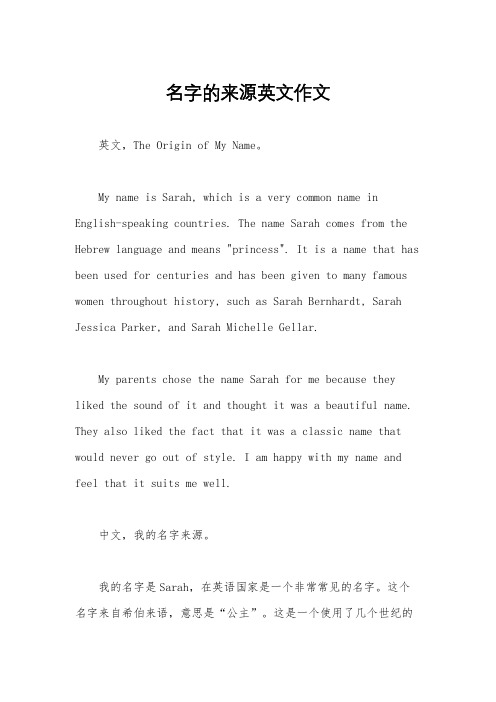
名字的来源英文作文英文,The Origin of My Name。
My name is Sarah, which is a very common name in English-speaking countries. The name Sarah comes from the Hebrew language and means "princess". It is a name that has been used for centuries and has been given to many famous women throughout history, such as Sarah Bernhardt, Sarah Jessica Parker, and Sarah Michelle Gellar.My parents chose the name Sarah for me because they liked the sound of it and thought it was a beautiful name. They also liked the fact that it was a classic name that would never go out of style. I am happy with my name and feel that it suits me well.中文,我的名字来源。
我的名字是Sarah,在英语国家是一个非常常见的名字。
这个名字来自希伯来语,意思是“公主”。
这是一个使用了几个世纪的名字,许多著名的女性都被赋予了这个名字,比如萨拉·伯恩哈特、萨拉·杰西卡·帕克和萨拉·米歇尔·盖拉。
我的父母选择给我取名为Sarah,因为他们喜欢这个名字的音响和美丽。
他们还喜欢这个名字是一个经典的名字,永远不会过时。
英语的来源 英文作文
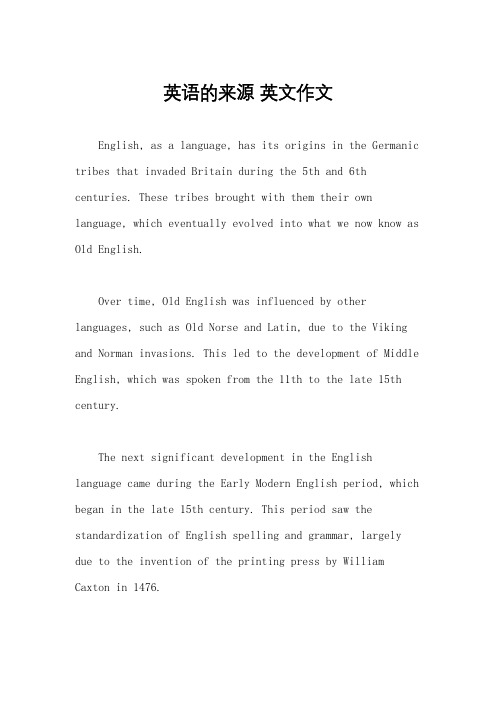
英语的来源英文作文English, as a language, has its origins in the Germanic tribes that invaded Britain during the 5th and 6th centuries. These tribes brought with them their own language, which eventually evolved into what we now know as Old English.Over time, Old English was influenced by other languages, such as Old Norse and Latin, due to the Viking and Norman invasions. This led to the development of Middle English, which was spoken from the 11th to the late 15th century.The next significant development in the English language came during the Early Modern English period, which began in the late 15th century. This period saw the standardization of English spelling and grammar, largely due to the invention of the printing press by William Caxton in 1476.During the 17th and 18th centuries, English continued to evolve, with the influence of the Renaissance and the Enlightenment. This led to the expansion of the English vocabulary, as scholars and writers borrowed words from other languages, such as Latin and Greek.In more recent times, English has continued to evolve through its interaction with other languages and cultures, particularly due to the British Empire and the global influence of the United States. This has led to the development of different varieties of English, such as British English, American English, and various forms of English spoken in former colonies.。
关于名字来源的英语作文
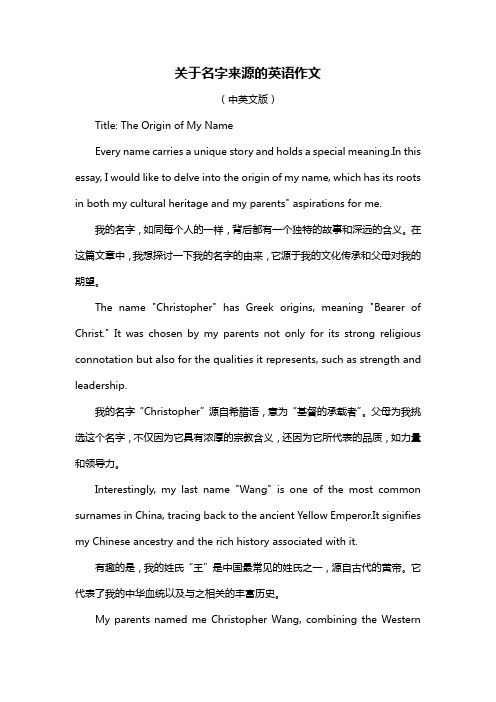
关于名字来源的英语作文(中英文版)Title: The Origin of My NameEvery name carries a unique story and holds a special meaning.In this essay, I would like to delve into the origin of my name, which has its roots in both my cultural heritage and my parents" aspirations for me.我的名字,如同每个人的一样,背后都有一个独特的故事和深远的含义。
在这篇文章中,我想探讨一下我的名字的由来,它源于我的文化传承和父母对我的期望。
The name "Christopher" has Greek origins, meaning "Bearer of Christ." It was chosen by my parents not only for its strong religious connotation but also for the qualities it represents, such as strength and leadership.我的名字“Christopher”源自希腊语,意为“基督的承载者”。
父母为我挑选这个名字,不仅因为它具有浓厚的宗教含义,还因为它所代表的品质,如力量和领导力。
Interestingly, my last name "Wang" is one of the most common surnames in China, tracing back to the ancient Yellow Emperor.It signifies my Chinese ancestry and the rich history associated with it.有趣的是,我的姓氏“王”是中国最常见的姓氏之一,源自古代的黄帝。
自己姓氏的来源英语作文200字
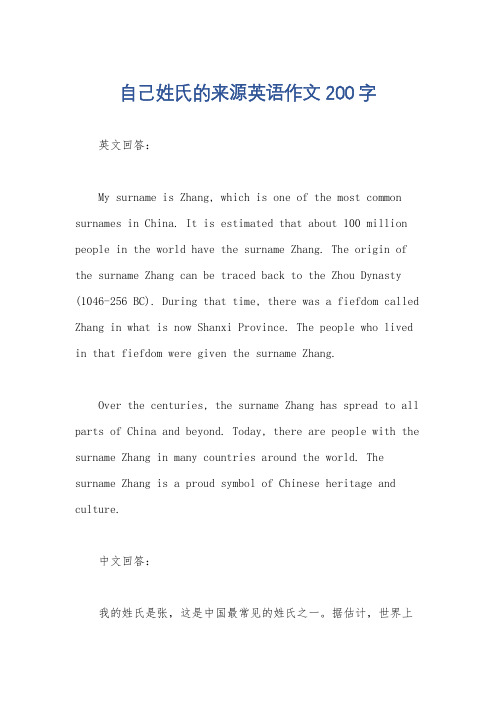
自己姓氏的来源英语作文200字英文回答:My surname is Zhang, which is one of the most common surnames in China. It is estimated that about 100 million people in the world have the surname Zhang. The origin of the surname Zhang can be traced back to the Zhou Dynasty (1046-256 BC). During that time, there was a fiefdom called Zhang in what is now Shanxi Province. The people who lived in that fiefdom were given the surname Zhang.Over the centuries, the surname Zhang has spread to all parts of China and beyond. Today, there are people with the surname Zhang in many countries around the world. The surname Zhang is a proud symbol of Chinese heritage and culture.中文回答:我的姓氏是张,这是中国最常见的姓氏之一。
据估计,世界上约有1亿人姓张。
姓氏张的起源可以追溯到周朝(公元前1046-256年)。
当时,在今天的山西省有一个封地叫张。
居住在封地的人被赐予姓张。
几个世纪以来,姓氏张传遍了中国各地乃至国外。
如今,世界许多国家都有姓张的人。
姓氏张是中国传统和文化的骄傲象征。
英语的来源英文作文

Title: The Origin and Evolution of the English LanguageIntroduction:The English language, with its rich history and diverse influences, has evolved over centuries to become one of the most widely spoken languages in the world today. Understanding the origins of English provides insight into the cultural, social, and linguistic transformations that have shaped its development.Body:The roots of the English language can be traced back to the Germanic tribes that inhabited what is now England in the early Middle Ages. Old English, also known as Anglo-Saxon, was the language spoken by these tribes and formed the basis of the language we know today. Influences from Latin, Norse, and French brought new vocabulary and grammar structures to Old English, creating a unique linguistic blend.The Norman Conquest of England in 1066 marked a significant turning point in the evolution of English. The influx of Norman French vocabulary and the influence of Norman culture and administration led to the emergence of Middle English, a period characterized by linguistic change and innovation. The works of Chaucer and other medieval writers reflect the evolving nature of the language during this time.The Renaissance period saw a resurgence of interest in classical languages and literature, which influenced the vocabulary and syntax of English. The printing press, introduced by William Caxton in the late 15th century, played a crucial role in standardizing spelling and grammar conventions, paving the way for the Modern English we use today.The global reach of the British Empire in the 18th and 19th centuries further expanded the influence of English, making it a lingua franca for trade, diplomacy, and cultural exchange. The adoption of English as an official language in many former colonies and the rise of the United States as a global power solidified the language's position as a dominant force in international communication.In the contemporary world, English continues to evolve and adapt to new technologies, media, and global interactions. The spread of English as a second language and the emergence of new varieties and dialects reflect the dynamic nature of the language in an increasingly interconnected world.Conclusion:In conclusion, the English language has undergone a complex and fascinating journey from its humble origins in the Germanic tribes of ancient England to its current status as a global language of communication and culture. The evolution of English is a testament to the enduring power of language to adapt, grow, and shape the world we live in.。
英语的由来英文版30字

英语的由来英文版30字英语的由来英文版The origin of English languageIntroduction:In today's globalized world, English has become the most widely spoken and recognized language. From business communication to social media, English dominates almost every aspect of our lives. But have you ever wondered how English came to be? In this article, we take a closer look at the origin and evolution of the English language.Part 1: The Germanic rootsEnglish is a West Germanic language that originated from the Anglo-Frisian dialects brought to Britain by Germanic tribes in the 5th century. The language evolved from the Old English period to Middle English and then to Early Modern English.Part 2: The Norman invasionIn 1066, the Norman Conquest of England brought about the introduction of Old Norman, a variety of Old French, to the island. This led to a major influence on the English language, which adopt many French words, phrases and idioms.Part 3: The RenaissanceDuring the Renaissance period, English saw a significant transformation inits vocabulary, grammar and spelling. This was due to the revival of classical learning and the widespread use of printing press that helped standardize the language across the country.Part 4: The colonial eraWith the growth of the British Empire, English became a global language as it spread across the world. The language absorbed new words and expressions from different cultures, leading to the development of regional dialects and accents.Part 5: Modern EnglishToday, English continues to evolve and adapt to changing times and cultures. With the emergence of technology and the internet, the language has seen the creation of new words and phrases, and the rise of internet slang and abbreviations.Conclusion:English is a language that has undergone many changes and transformations throughout history. From its Germanic roots to its global dominance, the language continues to shape and be shaped by the world we live in.。
英语的来源
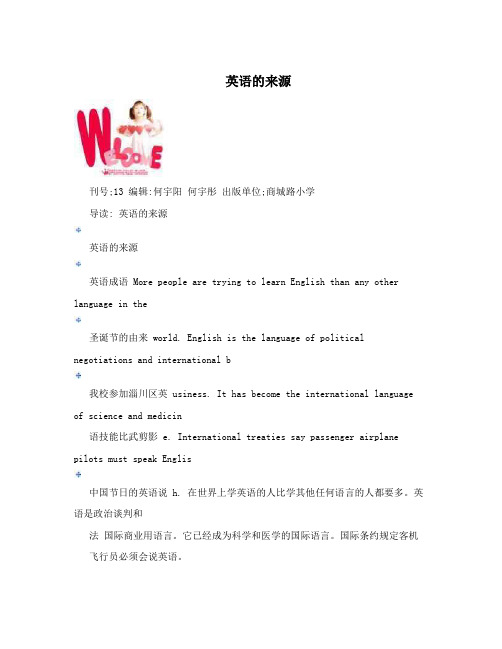
英语的来源刊号;13 编辑:何宇阳何宇彤出版单位;商城路小学导读: 英语的来源英语的来源英语成语 More people are trying to learn English than any other language in the圣诞节的由来 world. English is the language of political negotiations and international b我校参加淄川区英 usiness. It has become the international language of science and medicin语技能比武剪影 e. International treaties say passenger airplane pilots must speak Englis中国节日的英语说 h. 在世界上学英语的人比学其他任何语言的人都要多。
英语是政治谈判和法国际商业用语言。
它已经成为科学和医学的国际语言。
国际条约规定客机飞行员必须会说英语。
英语成语 English is the major foreign language taught in most schools in South America and Europe. School children in the Philippines and Japan begin learning English at an early age. English is the official language of more tA bad beginning makes a badhan seventy-five countries including Britain, Canada, the United States, Aending.不善始者不善终。
ustralia, and South Africa.英语是南美和欧洲多数学校的主要外语。
感恩节的由来英文版来源介绍
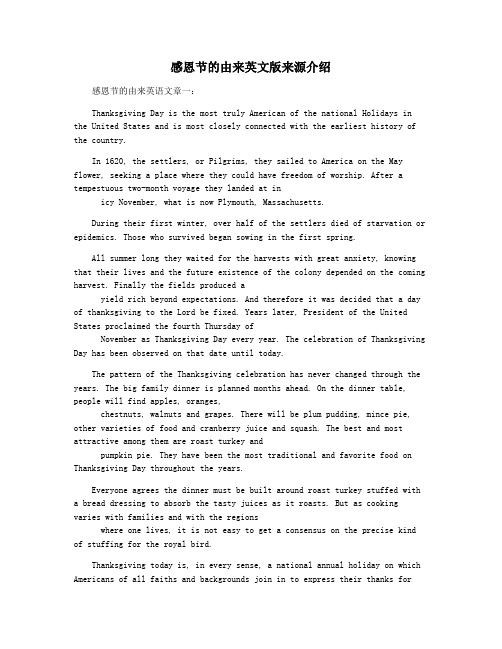
感恩节的由来英文版来源介绍感恩节的由来英语文章一:Thanksgiving Day is the most truly American of the national Holidays in the United States and is most closely connected with the earliest history of the country.In 1620, the settlers, or Pilgrims, they sailed to America on the May flower, seeking a place where they could have freedom of worship. After a tempestuous two-month voyage they landed at inicy November, what is now Plymouth, Massachusetts.During their first winter, over half of the settlers died of starvation or epidemics. Those who survived began sowing in the first spring.All summer long they waited for the harvests with great anxiety, knowing that their lives and the future existence of the colony depended on the coming harvest. Finally the fields produced ayield rich beyond expectations. And therefore it was decided that a day of thanksgiving to the Lord be fixed. Years later, President of the United States proclaimed the fourth Thursday ofNovember as Thanksgiving Day every year. The celebration of Thanksgiving Day has been observed on that date until today.The pattern of the Thanksgiving celebration has never changed through the years. The big family dinner is planned months ahead. On the dinner table, people will find apples, oranges,chestnuts, walnuts and grapes. There will be plum pudding, mince pie, other varieties of food and cranberry juice and squash. The best and most attractive among them are roast turkey andpumpkin pie. They have been the most traditional and favorite food on Thanksgiving Day throughout the years.Everyone agrees the dinner must be built around roast turkey stuffed with a bread dressing to absorb the tasty juices as it roasts. But as cooking varies with families and with the regionswhere one lives, it is not easy to get a consensus on the precise kind of stuffing for the royal bird.Thanksgiving today is, in every sense, a national annual holiday on which Americans of all faiths and backgrounds join in to express their thanks forthe year' s bounty and reverently ask forcontinued blessings.感恩节是美国国定假日中最地道、最美国式的节日,而且它和早期美国历史最为密切相关。
- 1、下载文档前请自行甄别文档内容的完整性,平台不提供额外的编辑、内容补充、找答案等附加服务。
- 2、"仅部分预览"的文档,不可在线预览部分如存在完整性等问题,可反馈申请退款(可完整预览的文档不适用该条件!)。
- 3、如文档侵犯您的权益,请联系客服反馈,我们会尽快为您处理(人工客服工作时间:9:00-18:30)。
English is one of the languages in the West Germanic branch. Its vocabulary is primarily influenced by other Germanic and Romance languages, and particularly by the French language.
English has been developing for more than 1400 years. Old English was divided into four dialects: the Anglian dialects, Mercian and Northumbrian, and the Saxon dialects, Kentish and West Saxon . The earliest forms of English are called Old English, which was brought to Great Britain by Anglo-Saxon settlers in the 5th century. After romans withdrawing from Britain, the Germanic language of the Anglo-Saxons became dominant in Britain, replacing the languages of Roman Britain.By the sixth century, a Latin alphabet was adopted, written with half-uncial letterforms. Old English is very different
from Modern English and difficult for 21st-century English speakers to understand.
Middle English began with the conquest of England by the Norman in 1066 and developed further in the period from 1200 to 1450,and was a period in which the language was influenced by French.In the period from the 8th to the 12th century, Old English gradually transformed through language contact into Middle English. During the Middle English period many Old English grammatical features were simplified or disappeared. Middle English developed out of Late Old English, seeing many dramatic changes in its grammar, pronunciation and orthography. In the 14th century, English became dominant in Britain again. By the end of the 14th century, the dialect of London had emerged as the emerged
as the standard dialect of what we now call Middle English. By the 12th century Middle English was fully developed, integrating both Norse and Norman features; it continued to be spoken until the transition to early Modern English around 1500.
The next period in the history of English was Early Modern English. English began to rise in prestige during the reign of Henry V. Early Modern English began in the late 15th century with the introduction of the printing press to London and the King James Bible, and the start of the Great Vowel Shift. All these factors had a major impact on the English language, especially on its vocabulary. The major source language was Latin, but loans from other languages, in particular French were also frequent. Literature from the Early Modern period included the works of William Shakespeare and King Fames
Bible influenced on the development of the English language during the last decades of the Renaissance.By 1750 most of the Old English irregular verbs had either dropped out of use or become regular. In this period, adjectives lost all endings except for in the comparative and superlative forms. And there were also a great many semantic changes, as old words acquired new meanings.
By the late 18th century, the British Empire had facilitated the spread of English through its colonies and geopolitical dominance.Settlers from Britain moved across the world from Britain moved across the world, the Modern English changed and developed, and took in words from other local languages. With the
increase in the communication, travel, radio and television, all these different types of English have mixed. So English continues to change and develop, with hundreds of new words appearing every year. A major feature in the early development of Modern English was the codification of explicit norms for standard usage, and their dissemination through official media such as public education and state sponsored publications.As the USA emerged as one of the economic powers of the 20th century, American English has become a dominant variety of the language. In terms of grammatical evolution, Modern English has now reached a stage where the loss of case is almost complete.。
